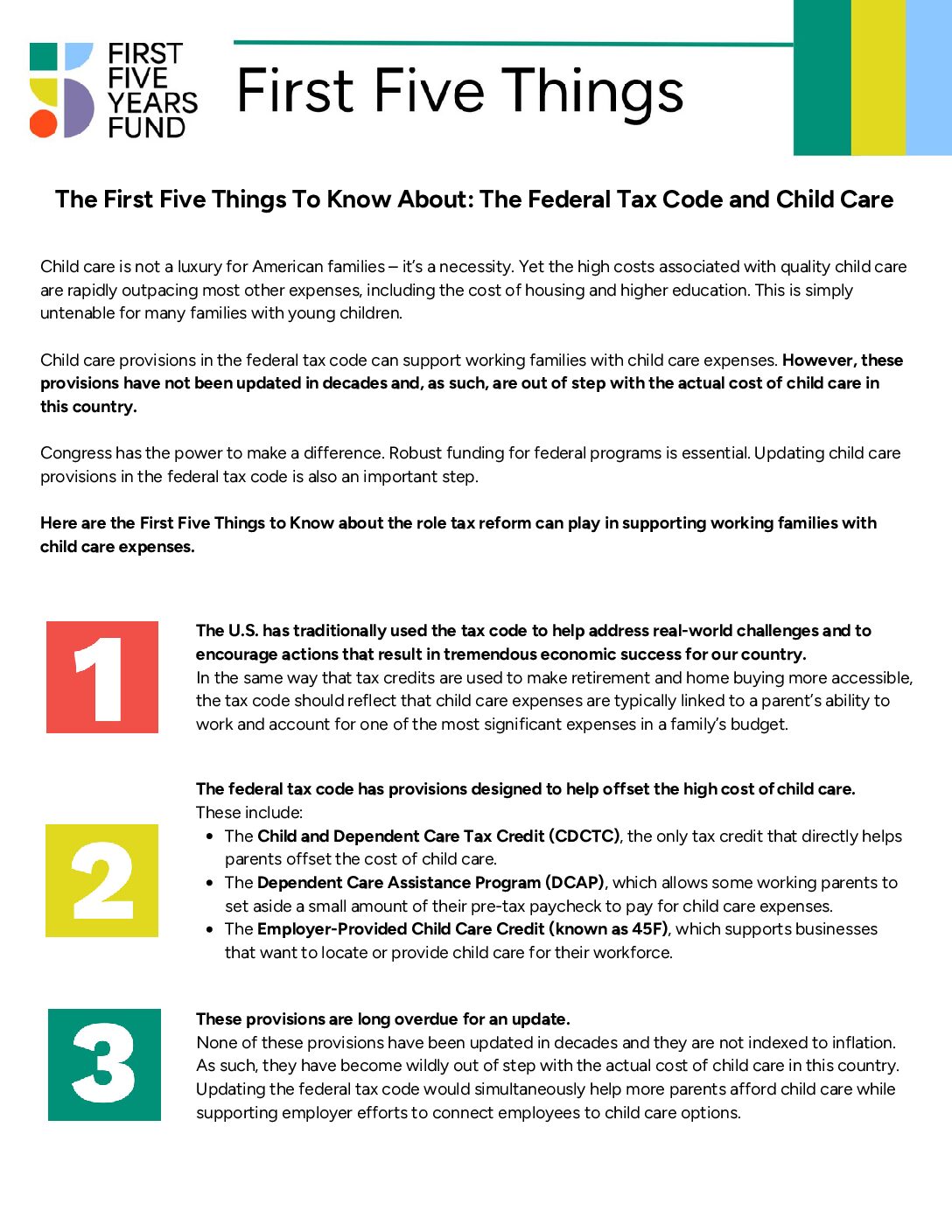The First Five Things To Know About: The Federal Tax Code and Child Care

Child care is not a luxury for American families – it’s a necessity. Yet the high costs associated with quality child care are rapidly outpacing most other expenses, including the cost of housing and higher education. This is simply untenable for many families with young children.
Child care provisions in the federal tax code can support working families with child care expenses. However, these provisions have not been updated in decades and, as such, are out of step with the actual cost of child care in this country.
Congress has the power to make a difference. Robust funding for federal programs is essential. Updating child care provisions in the federal tax code is also an important step.
Here are the First Five Things to Know about the role tax reform can play in supporting working families with child care expenses.

The U.S. has traditionally used the tax code to help address real-world challenges and to encourage actions that result in tremendous economic success for our country. In the same way that tax credits are used to make retirement and home buying more accessible, the tax code should reflect that child care expenses are typically linked to a parent’s ability to work and account for one of the most significant expenses in a family’s budget.

The federal tax code has provisions designed to help offset the high cost of child care. These include:
- The Child and Dependent Care Tax Credit (CDCTC), the only tax credit that directly helps parents offset the cost of child care.
- The Dependent Care Assistance Program (DCAP), which allows some working parents to set aside a small amount of their pre-tax paycheck to pay for child care expenses.
- The Employer-Provided Child Care Credit (known as 45F), which supports businesses that want to locate or provide child care for their workforce.

These provisions are long overdue for an update. None of these provisions have been updated in decades and they are not indexed to inflation. As such, they have become wildly out of step with the actual cost of child care in this country. Updating the federal tax code would simultaneously help more parents afford child care while supporting employer efforts to connect employees to child care options.

Updating child care tax policies to support working families is popular with Republican, Democratic, and Independent voters. In a national 2024 poll, 76% of voters supported expanding the CDCTC, including 62% of Republicans, 74% of Independents, and 92% of Democrats. And 84% supported an expanded 45F and DCAP, including 76% of Republicans, 82% of Independents, and 93% of Democrats.

The time is right. In 2025, there is momentum and opportunity to make change. With the major provisions of the Tax Cuts and Jobs Act of 2017 (TCJA) expiring at the end of 2025, Congress will be focused on tax debates next year. This provides a don’t-miss opportunity to reform the tax code and modernize the CDCTC (along with other child care-related tax provisions) to better help working families offset the cost of quality child care.
Updating the federal tax code to strengthen child care has bipartisan and multifaceted support.
Letters
- September 2023: Letter to Congress signed by 85 organizations, Chambers of Commerce and businesses
- January 2024: Letter to Ways + Means from leaders of the Bipartisan Pre-K and Child Care Caucus
- January 2024: Joint statement from 20+ national organizations
- August 2024: Letter to House Ways and Means Committee Tax Teams from more than 150 organizations, Chambers of Commerce and businesses.
- December 2024: Letter to incoming Trump administration signed by 127 national, state, and local organizations
Legislation
- Child Care Availability and Affordability Act – S. 4874 Sen. Katie Britt (R-AL), Sen. Tim Kaine (D-VA)
- The Child Care Investment Act of 2023 – H.R. 4571 Rep. Salud Carbajal (D-CA), Rep. Lori Chavez De-Remer (R-OR)
- The Promoting Affordable Child Care for Everyone (PACE) Act – H.R. 7360 Rep. Brad Schneider (D-IL), Rep. Claudia Tenney (R-NY)
- The Affordable Childcare Act – H.R. 8635 Rep. Sharice Davids (D-KS), Rep. Marc Molinaro (R-NY)
- And more in this list of tax bills.
Learn More
- The Chart: Comparing Tax Bills in the 118th Congress
- Side-by-Side: What tax provisions do and how they work together
- The Child Tax Credit and the Child & Dependent Care Tax Credit: Understanding the Differences
- State-Specific Data: Expanding the Child & Dependent Tax Credit in 2021
Contact
- For Press Inquiries: Jane Fillion, jfillion@ffyf.org
- For Legislative and Policy Inquiries: Vicky Kawesa, vkawesa@ffyf.org
About First Five Years Fund
The first five years last forever. At First Five Years Fund, we work to protect, prioritize, and build bipartisan support for quality child care and early learning programs at the federal level. Reliable, affordable, and high-quality early learning and child care can be transformative, not only enhancing a child’s prospects for a brighter future but also bolstering working parents and fostering economic stability nationwide. Join us at www.ffyf.org.
Subscribe to FFYF First Look
Every morning, FFYF reports on the latest child care & early learning news from across the country. Subscribe and take 5 minutes to know what's happening in early childhood education.




